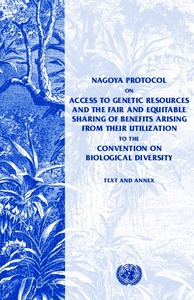Nagoya Protocol on Access to Genetic Resources and the Fair and Equitable Sharing of Benefits Arising from their Utilization to the Convention on Biological Diversity : text and annex.

View/
Average rating
votes
Date
2011Corporate Author
Secretariat of the Convention on Biological Diversity
Status
PublishedPages
15pp.
Metadata
Show full item recordAbstract
This booklet contains the text and annex of the Nagoya Protocol on Access to Genetic
Resources and the Fair and Equitable Sharing of Benefi ts Arising from their Utilization to the
Convention on Biological Diversity. The Convention on Biological Diversity was opened for signature on 5 June 1992 at the United Nations Conference on Environment and Development (the Rio
“Earth Summit”) and entered into force on 29 December 1993. The Convention is
the only international instrument comprehensively addressing biological diversity.
The Convention’s three objectives are the conservation of biological diversity, the
sustainable use of its components and the fair and equitable sharing of benefits
arising from the utilisation of genetic resources.
To further advance the implementation of the third objective, the World Summit on
Sustainable Development (Johannesburg, September 2002) called for the negotiation
of an international regime, within the framework of the Convention, to promote
.....
Publisher
Secretariat of the Convention on Biological DiversityMontreal, Canada
Document Language
enSustainable Development Goals (SDG)
14.ABest Practice Type
Best PracticeManual (incl. handbook, guide, cookbook etc)
ISBN
92-9225-306-9Citation
Secretariat of the Convention on Biodiversity (2011) Nagoya Protocol on Access to Genetic Resources and the Fair and Equitable Sharing of Benefits Arising from their Utilization to the Convention on Biological Diversity : text and annex. Montreal, Canada, Secretariat of the Convention on Biodiversity, 15pp. DOI: http://dx.doi.org/10.25607/OBP-789Collections
 Repository of community practices in Ocean Research, Applications and Data/Information Management
Repository of community practices in Ocean Research, Applications and Data/Information Management